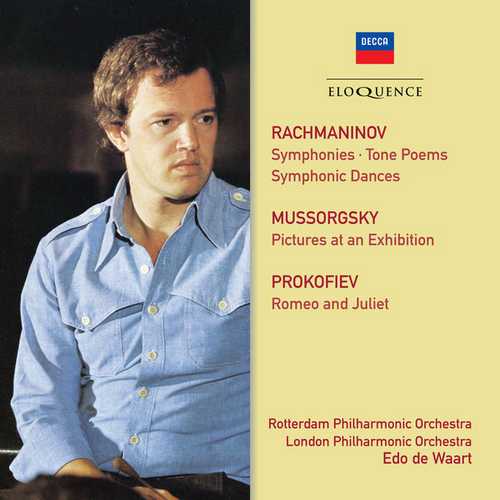
Composer: Modest Mussorgsky, Sergei Prokofiev, Sergey Rachmaninov
Orchestra: Rotterdam Philharmonic Orchestra, London Philharmonic Orchestra
Conductor: Edo de Waart
Format: FLAC (tracks)
Label: Eloquence
Catalogue: ELQ4828981
Release: 2018
Size: 1.27 GB
Recovery: +3%
Scan: cover
Rachmaninov: Symphony No. 1 in D minor, Op. 13
01. 1. Grave – Allegro ma non troppo
02. 2. Allegro animato
03. 3. Larghetto
04. 4. Allegro con fuoco
05. Rachmaninov: The Rock – Fantasy for Orchestra, Op. 7
06. Rachmaninov: Caprice Bohémien, Op. 12
Rachmaninov: Symphony No. 2 in E minor, Op. 27
07. 1. Largo – Allegro moderato
08. 2. Allegro molto
09. 3. Adagio
10. 4. Allegro vivace
11. Rachmaninov: The Isle of the Dead – Symphonic Poem, Op. 29
Rachmaninov: Symphony No. 3 in A minor, Op. 44
12. 1. Lento – Allegro moderato
13. 2. Adagio ma non troppo
14. 3. Allegro
Mussorgsky: Pictures at an Exhibition (Orch. by Maurice Ravel)
15. 1. Promenade
16. 2. Gnomus
17. 3. Promenade. Moderato commodo assai e con delicatezza
18. 4. The Old Castle
19. 5. Promenade. Moderato non tanto, pesamente
20. 6. The Tuileries Gardens
21. 7. Bydlo
22. 8. Promenade. Tranquillo
23. 9. Ballet of the Chickens in Their Shells
24. 10. Samuel Goldenberg and Schmuyle
25. 11. The Market-place at Limoges
26. 12. The Catacombs (Sepulchrum romanum)
27. 13. Cum mortuis in lingua mortua
28. 14. The Hut on Fowl’s Legs (Baba-Yaga)
29. 15. The Great Gate of Kiev
Rachmaninov: Symphonic Dances, Op. 45
30. 1. Non allegro
31. 2. Andante con moto (Tempo di valse)
32. 3. Lento assai – Allegro vivace
Prokofiev: Romeo and Juliet, Op. 64
33. Montagues and Capulets
34. The girl Juliet
35. Masks
36. Minuet
37. Father Lawrence
38. Dance
39. Dance of the maids
40. A scene
41. Tybalt’s death
42. Romeo and Juliet before parting
43. Romeo at Juliet’s tomb
A newly compiled, generous 4CD collection of high-octane Russian orchestral masterpieces, celebrating the hundredth anniversary of the Rotterdam Philharmonic Orchestra and the firebrand musicianship of Dutch maestro Edo de Waart.
‘In my profession,’ remarked Edo de Waart in a 1990 interview, ‘you need the affrontery to believe you have an alternative with something to say that isn’t already being said. Without this sort of gall 95 per cent of us should quit.’ His intensely practical and dynamic approach was formed by experience as an orchestral oboist, taught by the principal oboe of the Concertgebouw Orchestra in the days of Willem Mengelberg, nurtured by seeing Eduard van Beinum in action and further encouraged by Bernard Haitink: de Waart has the history of the Concertgebouw running through his veins. ‘I think people regarded me as a second Mengelberg, and I was very sure that I wasn’t.’ However, it was as chief of the rival Rotterdam Philharmonic that the conductor made his mark, in a series of recordings for Philips that played to his strengths in Romantic repertoire.
The conductor had earlier confessed to an initial reluctance to engage with the idiom of Rachmaninov. ‘Then I conducted the [Symphonic Dances] in Rotterdam several times, and suddenly I became very fond of it. I think his music grows on you as you get rid of the “honey and roses” view of him that you first learn. You must play him as strongly as the Russians used to do.’ In fact he recorded the Symphonic Dances with the London Philharmonic in 1972, but the following year he made his debut LP in Rotterdam with a personal, LP-length selection of excerpts from Prokofiev’s ballet Romeo and Juliet. There followed in December 1974 the Mussorgsky Pictures and then these powerfully built, authentically volatile accounts of the Rachmaninov symphonies between 1976 and 1978: recordings that made de Waart’s reputation and still stand up well to the competition today.
‘The Philips engineers, working in the Rotterdam orchestra’s fine de Doelen hall, have gone out of their way to provide sound that is not just spectacular but wonderfully weighted and rounded.’ Gramophone, November 1975 (Mussorgsky)
‘De Waart’s lithe, compact reading dovetails with Ormandy’s compelling Columbia of 1967 … The Rotterdam players […] play with razor-sharp precision and gleaming, transparent tone, imparting an unexpected freshness, and minimizing the grandiosity.’ Fanfare, March–April 1980 (Symphony No.1)
‘Edo de Waart’s reading is attractively volatile, bringing out the music’s freshness. With generally fast tempi the effect is emotionally lightweight, although the slow movement is very beautiful and the refined orchestral playing is naturally expressive throughout. The recording is full and well balanced.’ Penguin Guide to Records, 1982 (Symphony No.2)



